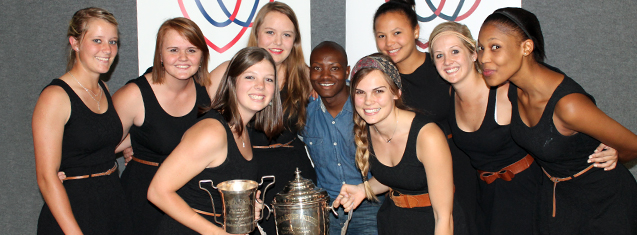
As examinations draw near and the end of the year is around the corner, residences want to know who the best of the best is.
During the 2014 Residence Awards on 22 October, the UFS announced their best managed residences of the year at the Bloemfontein Campus.
Wag-’n-Bietjie walked away with the spoils of the evening, winning both best managed female residence, and best managed residence overall. Armentum claimed the title of best managed male residence, while Sonnedou was named as the best managed day residence.
Further results for overall best managed residences and other categories are as follows:
Best Managed Residence
Male Residences:
- Armentum
- JBM Hertzog
- Karee
Female Residences:
- Wag-‘n-Bietjie
- Roosmaryn
- Soetdoring
Day Residences:
- Sonnedou
- Imperium
- Marjolein
Overall Ranking:
- Wag-‘n-Bietjie
- Armentum
- Roosmaryn
College
- South College (Armentum, Emily Hobhouse, Marjolein, NJ vd Merwe, Villa Bravado)
- East College (Arista, JBM Hertzog, Kayalami, Roosmaryn, Legatum, Sonnedou)
and North College (Madelief, Tswelopele, Vergeet-my-Nie, Veritas, Welwitschia)
- Central College (Akasia, Kagiso, Karee, Soetdoring, Wag-‘n-Bietjie)
and West College (Abraham Fischer, Conlaurês, Imperium, Kestell, Outiniqua)
Environmental Affairs
Male Residences: JBM Hertzog
Female Residences: Wag-‘n-Bietjie
Day Residences: Sonnedou
Overall Winner: Sonnedou
Diversity
Male Residences: JBM Hertzog
Female Residences: Akasia
Day Residences: Arista
Best Improved Male Residence: Villa Bravado
Best Improved Female Residence: Kestell
Overall winner: Akasia
Executive Portfolios
Male Residences: Tswelopele
Female Residences: Wag-‘n-Bietjie
Day Residences: Imperium
Best Improved Male Residence: Tswelopele
Best Improved Female Residence: Marjolein
Overall Winner: Imperium
Academics
Male Residences: Outeniqua
Female Residences: Wag-‘n-Bietjie
Day Residences: Imperium
Best Improved Male Residence: Imperium
Best Improved Female Residence: Marjolein
Overall Winner: Wag-‘n-Bietjie
Finance
Male Residences: Armentum
Female Residences: Roosmaryn
Day Residences: Imperium
Best Improved Male Residence: Villa Bravado
Best Improved Female Residence: Kestell
Overall Winner: Armentum
Culture
Male Residences: Abraham Fischer
Female Residences: Wag-‘n-Bietjie
Day Residences: Sonnedou
Best Improved Male Residence: Armentum
Best Improved Female Residence: Akasia
Overall Winner: Wag-‘n-Bietjie
Sport
Male Campus and Day Residences: Armentum
Female Campus and Day Residences: Wag-‘n-Bietjie
Best Male RC Sport: Armentum
Best Female RC Sport: Sonnedou
First-Years
Male Residences: Armentum
Female Residences: Welwitschia
Day Residences: Sonnedou
Best Improved Male and Female Residence: ConLaurês and Outeniqua
Overall Winner: Armentum
Prime
Male Residences: Tswelopele
Female Residences: Wag-‘n-Bietjie
Day Residences: Arista
Best Improved Male Residence: Tswelopele
Best Improved Female Residence: Arista
Overall Winner: Tswelopele
Social
Overall Winner: Karee
Best Improved Residence: Kestell